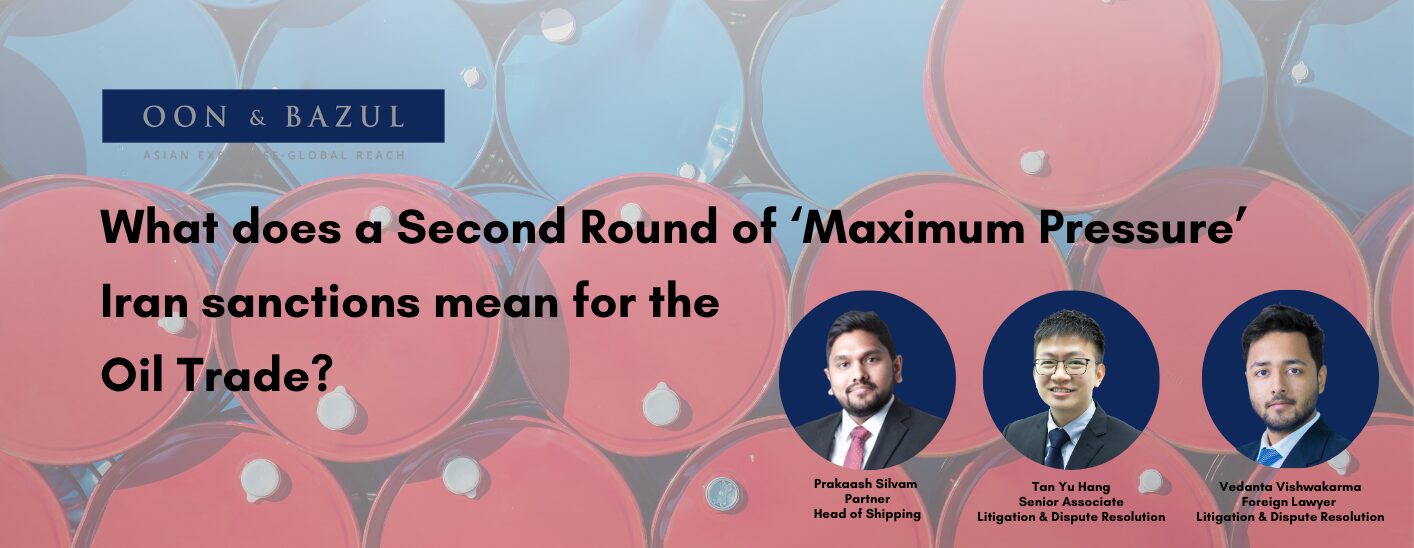What does a Second Round of ‘Maximum Pressure’ Iran sanctions mean for the Oil Trade?
On 4 February 2025, U.S. President Donald Trump restored his “maximum pressure” campaign on Iran. While the details of the promised maximum pressure campaign are yet to emerge, the specific promise to reduce Iraninan oil exports to zero, implies that the oil trade will come in for specific attention.
The possibility of sanctions on port operators will mean that the ports are very likely to only allow “clean” vessels with no OFAC sanction designations. This increases the freight cost for end buyers given that there are more than 1200 vessel names on the OFAC list, as of 11 February 2025. There is also the question of how much room the Trump administration has to expand the already extensive array of sanctions targeting Iranian oil exports.
For now, parties who are involved in the oil trade can take guidance from the compliance note which was issued by five US government agencies in December 2023 directing companies and institutions to impose stricter “Know Your Cargo” practices.
What are the signs to look out for?
It is essential for companies and entities involved in the maritime or trade industries to be highly aware of the following warning signs that could indicate the evasion of sanctions, especially in geographically high-risk areas:
- Manipulation of location signals or identification data by disabling their tracking system to evade legal restrictions.
- Falsification of vessel and cargo documents to hide the cargo’s origin and destination.
- Opaque management and ownership structures to disguise the beneficial owner and the entities involved in the transportation of cargo.
- Repeated registration changes through “flag hopping” to avoid getting caught under national laws.
- Concealment of the cargo’s origin or destination through rerouting, transshipment or use of anomalous shipping routes without legitimate reason
- Ship-to-ship transfers in high-risk places or at night
For example, the practice of ship-to-ship transfers has been commonly linked to movements of Russian oil. It is also common for certain actors to employ an obscure management system and a network of companies to disguise their involvement in the transport of oil cargoes.
What are the best compliance practices?
The compliance note strongly emphasizes that it is necessary for companies and entities in the maritime and trade industries to “know your cargo” by either strengthening their current compliance practices or implementing newer, stronger ones. Recommended practices to minimise the risk of sanctions evasion include but are not restricted to:
- Development and institutionalisation of sanctions and compliance programs with standardised policies.
- Establishment of contractual obligations, risk-based due diligence, and location monitoring practices.
- Know your customer through the exercise of due diligence on counterparties.
- Exercise supply chain due diligence by reviewing copies of licences and documents such as bills of lading.
- Facilitation of industry-level information sharing to boost awareness of warning signs of illicit conduct and measures to mitigate risks.
The compliance note also highlights the additional responsibility of freight forwarders to make accurate representations when filing documents about export controls. This also applies to freight forwarders who are not based in the United States, as they may still facilitate transactions through the US financial system.
Key takeaways
The compliance note is useful for all players in the shipping and international trade sectors, including non-US persons and entities. The US government has the power to pursue both civil and criminal actions and intend to use their enforcement discretion to ensure that all US-incorporated entities and their overseas branches, as well as non-US persons, abide by the sanctions. Ultimately, the onus is on companies and entities in the maritime industry to be vigilant about their compliance practices and warning signs. They would need to conduct regular due diligence on all vessels and cargoes and must take suitable steps when faced with facts (red flags) which indicate that a particular shipment breaches US sanctions.
This client update was authored by Partner and member of the Association of Certified Sanctions Specialists (ACSS), Prakaash Silvam, Senior Associate Tan Yu Hang and Foreign Lawyer Vedanta Vishwakarma.
Businesses who do not have an internal compliance department may find it difficult to navigate the maze of United Nations, United States, European Union and United Kingdom regulations and sanctions. Oon & Bazul’s Sanctions & Regulatory Compliance Practice is frequently called upon to advise businesses, financiers, and insurers on the application of fast-evolving domestic, regional, and international regulatory and sanctions frameworks. We have been assisting clients with sanctions advice, processes, and policies, and have also been advising on drafting commercial contracts, financing arrangements, and deals to ensure that the documents address any sanctions-related risks.
You may visit our Sanctions & Regulatory Compliance page to learn more about our practice: https://oonbazul.com/sanctions-regulatory-compliance/
If you require any legal advice on sanctions related matters, please do not hesitate to get in touch with the authors above. You may download the copy of the PDF here.



